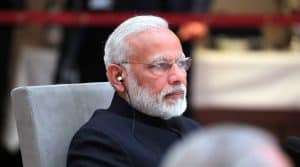
India is seeking to change laws to allow private miners to extract lithium, the key ingredient for batteries used for electric vehicles and energy storage, as the nation aims to be more self-sufficient in green technologies.
Prime Minister Narendra Modi’s government wants lawmakers’ approval for amendments to existing policies in the current session of parliament, according to people familiar with the plans. Eight minerals, including lithium, beryllium and zirconium will be removed from a restricted list that currently prohibits production by private companies.
The changes would allow the government to auction permits to exploit lithium reserves, the people said, asking not to be named as the matter is not yet public. They are also aimed at reducing India’s dependence on imports for some key minerals, and to put the country in a better position to compete in the lucrative battery supply chain, according to the people.
A mines ministry spokesperson didn’t immediately respond to a request for comment.
India wants to add local manufacturing of a swathe of zero-emissions technologies as it chases a target of becoming carbon neutral by 2070 and to capture opportunities from the global transition to cleaner energy. The nation has pledged to build 500 gigawatts of clean power capacity by 2030, and the deployment of huge volumes of battery storage is seen as vital to enable round-the-clock use of renewables.
Government agencies have been exploring for lithium and discovered a small resource at a site in southern Karnataka state, according to the mines ministry. Still, to produce lithium at any meaningful scale and reduce reliance on imports, India would need to find and develop further deposits.
Australia and Chile currently dominate raw materials output, while China is the world’s largest refiner.
India’s imports of lithium-ion batteries jumped 54% from a year earlier to $1.83 billion in the year ended March, trade ministry data show. Almost 87% of the purchases came from China and Hong Kong, despite India’s efforts to shun imports from its northern neighbor
Besides effort to boost local output, the country is also scouting for lithium and cobalt assets overseas. A joint venture has been formed with three state companies — National Aluminium Co., Hindustan Copper Ltd. and Mineral Exploration Corp. — to acquire mines overseas.
“This policy change is intended to reduce the import dependence, though other than some recent small discoveries in Karnataka, India doesn’t have known reserves of lithium” said Debasish Mishra, a Mumbai-based partner at Deloitte Touche Tohmatsu, adding the aim is also to boost exploration and mining activities by attracting private participation. “This is a welcome step but this would also require more promotion and incentives from the government.”
